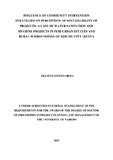| dc.description.abstract | Global coverage of improved water and sanitation vary significantly within and across
countries, with low income countries at 49% compared to 98% in high income countries. The
burden of poor access falls primarily on poor populations and account for 3.4 million global
deaths, heavy financial losses and loss of over 590 millions hours of productive time nursing
water, sanitation and hygiene related illnesses and school going time for children. While
investment in the water sector, especially in developing countries, is still inadequate, a
significant proportion of the projects are ill-conceived and poorly implemented leading to
premature failures and abandonment. This study sought to establish the influence of
community intervention strategies- participation, empowerment, capacity building, conflict
management and ownership on the perceived sustainability of water sanitation and hygiene
(WASH) projects. It adopted a mixed method research anchored on a concurrent triangulation
design. It targeted government and donor funded WASH projects within 148,494 households
in eight sub-locations in the peri-urban and surrounding rural settlements in Kisumu city,
Kenya. A sample size of 384 households was picked guided by Krejcie and Morgan model at
95% C.I and proportionately distributed across the study area using a multi-stage sampling
technique. Individual households were identified using a systematic sampling procedure and
the respective heads subjected to a face to face questionnaire administration. Fifteen projects
(30% of WASH projects population) were sampled and for every project, between 7-10
ordinary members of the projects and beneficiaries were randomly selected and included in
Focus Group Discussions. Data was collected over a period of three months. Instrument
validity was ensured with input from two research experts from the University of Nairobi
while reliability was determined using a split-half testing technique. Chi-square test for
independence statistic and Binary logistic regression model in SPSS software version 17 was
used to analyse quantitative data while qualitative data was analysed using content analysis
method. The study established a significant independent influence of community
participation ( p < 0.001), capacity building (p < 0.001), empowerment (p < 0.001) and
conflict management (p < 0.001) on sustainability of projects at 5% level of significance.
When adjusted for confounding effects, the influence of community participation (P=0.002),
capacity building (P=0.001), community empowerment (P<0.001), conflict management
(P=0.003), community ownership (P<0.001) and the interaction between capacity building
and community ownership(P<0.02) on sustainability of WASH projects were found to be
significant. Strong and moderate levels of community participation {odds ratio (OR) strong
(S) 7.7; moderate (M) 1.3}, capacity building {OR (S) 14.3; M 1.95}, empowerment {OR (S)
76.9; M 12.7}, and conflict management {OR (S) 27.5; M 6.5} were more likely to increase
sustainability probabilities when compared to weak levels before adjusting for confounding
factors. It was concluded that community participation, capacity building, community
empowerment and conflict management had a significant independent and simultaneous
influence on sustainability of WASH projects. As their strength levels increased,
sustainability probabilities of WASH projects increased significantly. In addition, community
ownership had a significant moderating effect on the interaction between capacity building
and sustainability of WASH projects. The study recommends that WASH projects should
ensure informed and active participation of communities in project identification and
implementation. Communities should be strongly empowered and their capacities, especially
of the management committee, sufficiently built in project management particularly in project
establishment, technical, financial and conflict management. Further, WASH projects should
be initiated and implemented in a manner that facilitates sufficient community sense of
ownership. Future research should explore WASH projects sustainability against dependency
on sorely internally generated funds and sustained external funding. | en_US |

